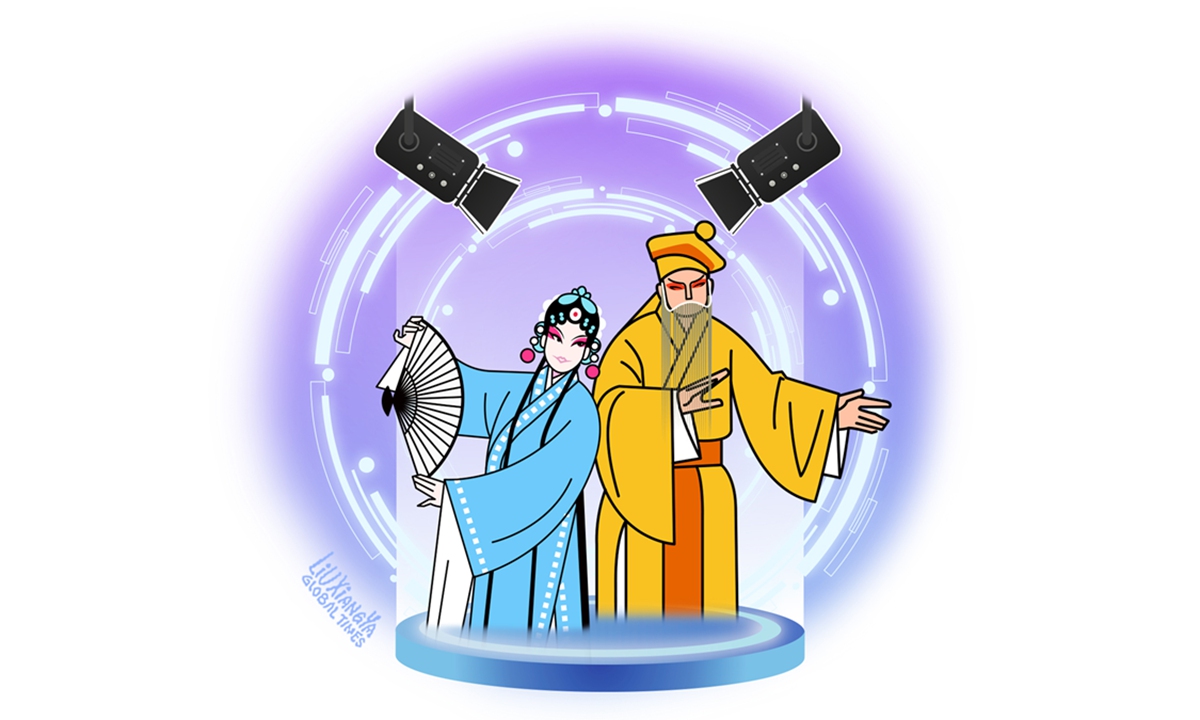
Illustration: Liu Xiangya/GT
A cautionary saying has been around in China for centuries: "Change brings prosperity while stagnation leads to decline."
Amid the changes and reform of traditional culture, the successors of traditional Chinese operas have been using this saying as a guide to carve out their own path with the help of high technology such as AI.
Their efforts have certainly paid off as the ancient art form has gained new life among the younger generation.
More than 7 million internet users were captivated by a live stream themed "When technology meets the beauty of traditional opera" in February 2024.
One of the highlights of the stream were how nearly 50 classic operas were presented to audiences in a brand-new way by relying on diverse digital technologies, including AI and "six degrees of freedom," which refers to the six mechanical degrees of freedom of movement of a rigid body.
In the comments section of the live stream, many netizens were not stingy with their praise for the beauty of traditional Chinese opera, which was clearly displayed up close and intimate rather than being portrayed as cold and stand-offish.
This is just one of the examples of the soaring influence of traditional opera today, especially among digital natives.
In theaters, demand for brilliant operas that have been updated by VR technology and high-tech stage design, like the youth-orientated versions of the Kunqu Opera
The Peony Pavilion or the Peking Opera
Dragon and Phoenix, has been booming. You cannot even buy a ticket if you hesitate for even a second.
The revival of this ancient art and the limitless possibilities of blending opera and technology has also gained traction abroad.
When Tim Cook, CEO of Apple, arrived in Shanghai in 2023, he spared half an hour from his busy schedule to pay a special visit to a Peking Opera studio founded by well-known Chinese performer Wang Peiyu to see how high-tech tools have spurred the vitality of opera.
People should always be the core of traditional Chinese opera development. In many masterpieces of traditional opera, technology has not fundamentally shaken the value of people on stage, but rather highlights the role of performers.
In 1905, only 17 years after the invention of cinema,
Dingjun Mountain, adapted from the Peking Opera of the same name, became the first Chinese film.
The impact of opera was broadened because of this new medium. With the wider adoption of electric lights, night theaters became more and more popular as mass venues.
This history shows that traditional Chinese opera has always been following the progress of the times with arms open to welcome transformation.
Various effective attempts have been made to achieve "opera plus technology," but only relying on technology is insufficient to promote traditional opera. How to creatively write stories suitable for today's tastes is another important issue under consideration.
Trump on Show, a surreal new Cantonese Opera, which debuted in Hong Kong in 2019, tells a fictionalized account of the former US president's quest to find his long-lost twin brother Chuan Pu, who was raised in China.
Connecting a performance art dating back to 500 years ago with the present politicians at the eye of the storm and international politics, the show spawned hot discussions on the internet after its premiere.
The surge in interest in Yue Opera stems from the viral success of
New Dragon Gate Inn by the Zhejiang Xiaobaihua Yue Opera Theatre.
Debuted in March 2023, the show, adapted from the 1992 classic action movie of the same name while also adding to the story to cater to young audiences' tastes, sold out within minutes.
The assistance of technology and innovation has injected new life into traditional Chinese opera, which has gathered the support of the younger generation to usher in a new age.
However, challenges still exist, including the inappropriate use of technology on stage that harms the atmosphere of opera and some scripts that repeat certain themes too many times, which shows that the successors of traditional opera need to further learn professional skills and never forget the goal of providing the ultimate artistic experience to audiences.
To win the long-lasting support of all generations, diverse forms of culture should concentrate on empowering human beings with technology, and remember that "Change brings prosperity."
The author is a reporter with the Global Times. life@globaltimes.com.cn




